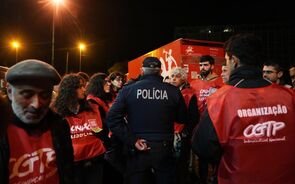Questão do desemprego nos States (artigo do Irwin Kellner)
2 mensagens
|Página 1 de 1
excelente!!
sem falar directamente,
toca certeiramente, milimetricamente na questao essencial acerca da economia e dos mercados!
obrigado, continua a colocar posts destes
cumps
toca certeiramente, milimetricamente na questao essencial acerca da economia e dos mercados!
obrigado, continua a colocar posts destes
cumps
Questão do desemprego nos States (artigo do Irwin Kellner)
Questions aplenty
Even beyond war, investors face plenty of doubts and questions.
Spring brake
Commentary: Potent ripple effect from lack of job growth
By Dr. Irwin Kellner, CBS MarketWatch.com
Last Update: 10:50 AM ET April 8, 2003
NEW YORK (CBS.MW) -- Now that the war in Iraq appears to be entering its final stages, we will soon find out if this is the only reason business has been holding back or if there are more fundamental concerns impinging on the U.S. economy.
On one thing there is no doubt: The economy stopped growing in February, and it's been going backward ever since.
This means that economic growth all but disappeared in the first quarter, after slowing to a miserable 1.4 percent pace in the final three months of 2002.
So, does this mean that we've tumbled into a new recession or are we still mired in the previous downturn that began in March 2001?
Only the National Bureau of Economic Research, the umpire of the business cycle, knows for sure -- and it's not saying anything, at least not yet.
As far as the rest of us are concerned, this is a moot question.
Jitters about paychecks
Indeed, the loss of nearly half a million jobs in the past two months alone is upsetting people more than any uncertainty related to the war. Moreover, it's taking longer for an unemployed person to find a job than it used to.
The percentage of people out of work for six months or longer is at one of its highest points in the past 50 years. And, more and more people have been without a job for a year and a half or even longer.
Not surprisingly, many of these long-term unemployed have become discouraged, and thus have stopped looking for work. That's why the unemployment rate has stayed below 6 percent even though well over 2 million jobs have been lost since President Bush took office.
People have slowed their spending, although it's hard to tell whether it is due only to economic concerns or if the "CNN effect" -- that is, people staying home to watch the war on television -- is a factor as well.
Whatever the case, sales of such big-ticket items as cars and homes are down, and airline travel has dropped with tourism on the skids as well. Consequently, retailers have downgraded their expectations for the balance of this year and in turn are buying less from wholesalers and manufacturers.
Not surprisingly, the nation's factories are operating at their slowest pace in about 20 years. With over one-quarter of productive capacity lying idle, it's no surprise that capital spending remains weak.
It's hard to blame all these developments on the war, since most such inputs were exerting an economic impact long before we even threatened to invade Iraq.
What's more, while we are pretty sure of its outcome, no one knows just how and when this war will end.
The sooner we remove the war as an uncertainty the better. Maybe it's time to declare victory and go home.
Even beyond war, investors face plenty of doubts and questions.
Spring brake
Commentary: Potent ripple effect from lack of job growth
By Dr. Irwin Kellner, CBS MarketWatch.com
Last Update: 10:50 AM ET April 8, 2003
NEW YORK (CBS.MW) -- Now that the war in Iraq appears to be entering its final stages, we will soon find out if this is the only reason business has been holding back or if there are more fundamental concerns impinging on the U.S. economy.
On one thing there is no doubt: The economy stopped growing in February, and it's been going backward ever since.
This means that economic growth all but disappeared in the first quarter, after slowing to a miserable 1.4 percent pace in the final three months of 2002.
So, does this mean that we've tumbled into a new recession or are we still mired in the previous downturn that began in March 2001?
Only the National Bureau of Economic Research, the umpire of the business cycle, knows for sure -- and it's not saying anything, at least not yet.
As far as the rest of us are concerned, this is a moot question.
Jitters about paychecks
Indeed, the loss of nearly half a million jobs in the past two months alone is upsetting people more than any uncertainty related to the war. Moreover, it's taking longer for an unemployed person to find a job than it used to.
The percentage of people out of work for six months or longer is at one of its highest points in the past 50 years. And, more and more people have been without a job for a year and a half or even longer.
Not surprisingly, many of these long-term unemployed have become discouraged, and thus have stopped looking for work. That's why the unemployment rate has stayed below 6 percent even though well over 2 million jobs have been lost since President Bush took office.
People have slowed their spending, although it's hard to tell whether it is due only to economic concerns or if the "CNN effect" -- that is, people staying home to watch the war on television -- is a factor as well.
Whatever the case, sales of such big-ticket items as cars and homes are down, and airline travel has dropped with tourism on the skids as well. Consequently, retailers have downgraded their expectations for the balance of this year and in turn are buying less from wholesalers and manufacturers.
Not surprisingly, the nation's factories are operating at their slowest pace in about 20 years. With over one-quarter of productive capacity lying idle, it's no surprise that capital spending remains weak.
It's hard to blame all these developments on the war, since most such inputs were exerting an economic impact long before we even threatened to invade Iraq.
What's more, while we are pretty sure of its outcome, no one knows just how and when this war will end.
The sooner we remove the war as an uncertainty the better. Maybe it's time to declare victory and go home.
-
Info
2 mensagens
|Página 1 de 1


